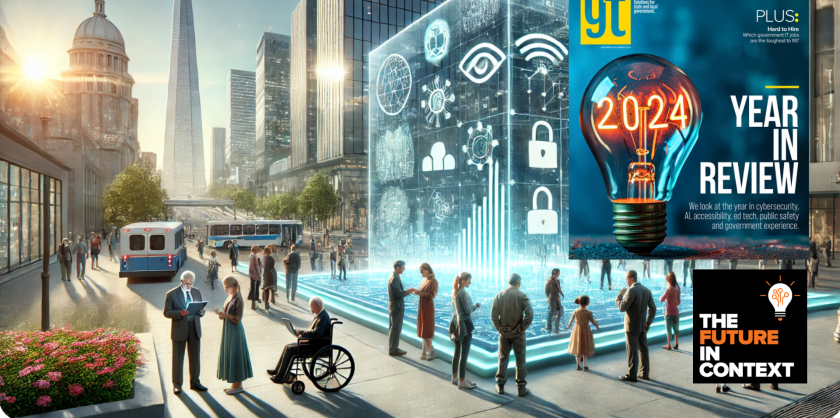The Future in Context
In a pivotal year, governments enacted AI laws, strengthened defenses, bridged the broadband gap, and prioritized accessible, user-friendly digital services. As 2025 nears, most jurisdictions still lack fully mature AI frameworks.
Future in Context
Elon Musk’s $44 billion deal to buy Twitter roiled the Internet despite his claims to be acting in the interests of free speech and transparency. An author argues that crowd-sourcing wisdom is a poor substitute for old-school expertise in the search for truth.
As the 50th anniversary of the break-in approaches, a recent book charts the transformation of the Nixon administration’s bungled burglary to a redefinition of America’s relationship with its leaders and institutions.
Weeks after the U.S. and the G7 countries weaponized the global financial system to impose their harshest-ever sanctions on Russia, fissures are becoming apparent. Countries impose but often backpedal on sanctions against bad actors for a simple reason — a reluctance to go to war.
The elevation of Judge Ketanji Brown Jackson to the nation’s highest court will not only make history but help shape America’s future, one case at a time.
Defending an "unteachable" classic of American literature has become the life’s work of a Twain scholar, costing him professionally and personally.
After a stormy confirmation process characterized by partisan recriminations in the U.S. Senate, Ketanji Brown Jackson appears to be set to take her seat on the Supreme Court. More than three dozen others have been denied over the last 235 years.
In the 19th century, Franconia Notch, a popular tourist site known for its pristine beauty, came under threat from the logging industry. A coalition of women’s groups started a grass-roots campaign to conserve the region.
Just 51 years old, nominee Ketanji Brown Jackson, if confirmed, would join a growing list of relatively young justices who are likely to serve for much longer than was anticipated when lifetime appointments were first codified.
Congress’ “advice and consent” to the president on appointments to the judiciary has become sharply partisan — and the numbers prove it.
Our resident historian explores three things – court packing, judicial review and meeting the expectations of the appointing presidents – that are not what you thought they were.
The radicalization of a congressional clerk in the 1800s and the introduction of the telegraph set a young country on a new trajectory.
The war in Ukraine has triggered an outpouring of sympathy for the plight of the people under attack, but also a surprising amount of isolationist sentiment. It’s not the first time this has happened.
In 1788, Thomas Jefferson hastily wrote an account of his travels in Europe for two friends. That obscure guide sent a Virginia attorney on a journey that connects past and present in unexpected ways.
Concrete, steel and turbines play an outsize role in the past and future of water in western states.
In 1917 the Supreme Court knocked down a discriminatory land use practice in Louisville, Ky. While the case made overt zoning segregation illegal, state and local government continued to find alternative ways to divide communities along racial lines.
Without Henry, there might not have been a United States. But the central role this sometimes forgotten Founding Father played in America’s Revolution and design of the young republic has been largely overlooked.
The city is no longer America’s steeltown. But how did it become a leader in health care? Author Gabriel Winant explains how economic realities allowed this service industry to emerge from the region’s old labor movement.
Hamilton, Adams, Jefferson and the struggle for a more perfect union.
Donald Trump’s remarks at a recent rally in Texas and polling results, in which a growing number of respondents justify violence against the government, keep last year’s Capitol riot in the spotlight.
Despite a stellar career that started in the Roosevelt administration, Weaver’s appointment to head the Department of Housing and Urban Development in 1966 didn’t come easy.
Virginia’s first Hispanic American attorney general calls for respect for the law and differences of opinion, and cutting back on how much cable news we watch.
From 1890-1930, they exploded across the American landscape, offering people the chance to own a home just outside the city. Lack of government support curtailed their growth, but these historic neighborhoods serve as models for efficient urban planning.
Often audacious, these bundled bills attempt to get a lot done in a hurry, loosening scrutiny on the public purse in the meantime.
A journalist and her husband leave California and head east to take over the 530-acre family farm.
A recent road trip results in an unplanned stop to mark the 131st anniversary of a tragedy on the Great Plains that remains indelibly stamped on a community’s memory.
The nation survived the burning of the Capitol by the British in 1814, the Civil War and the corruption of Richard Nixon. But with most Republicans siding with Trump and the insurrectionists, we face a threat to democracy unlike any other.
A liberal arts education is about more than preparing students with skills in demand in the marketplace. Author Roosevelt Montás explains how studying "the classics" can change lives and matter more than ever.
Located in upstate New York with a population of less than 4,000, Lake Placid was not an obvious choice for the 1932 Winter Olympics. But one man used his political savvy – with a little help from a future president – to turn the town into a two-time Olympic host.
Historian H. W. Brands’ new book draws out the complexities of the country’s original great struggle and what it can tell us about where we are today.
Journalist and historian Jay Cost says this is not the time to get rid of parties but have them rise to the challenge and help make a more perfect union.
About This Podcast
Most Read

































